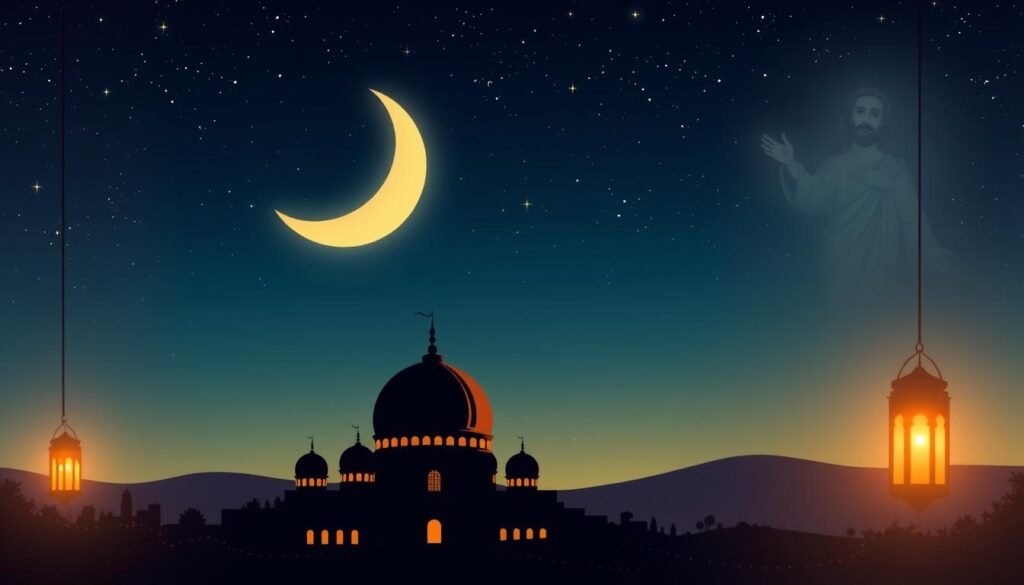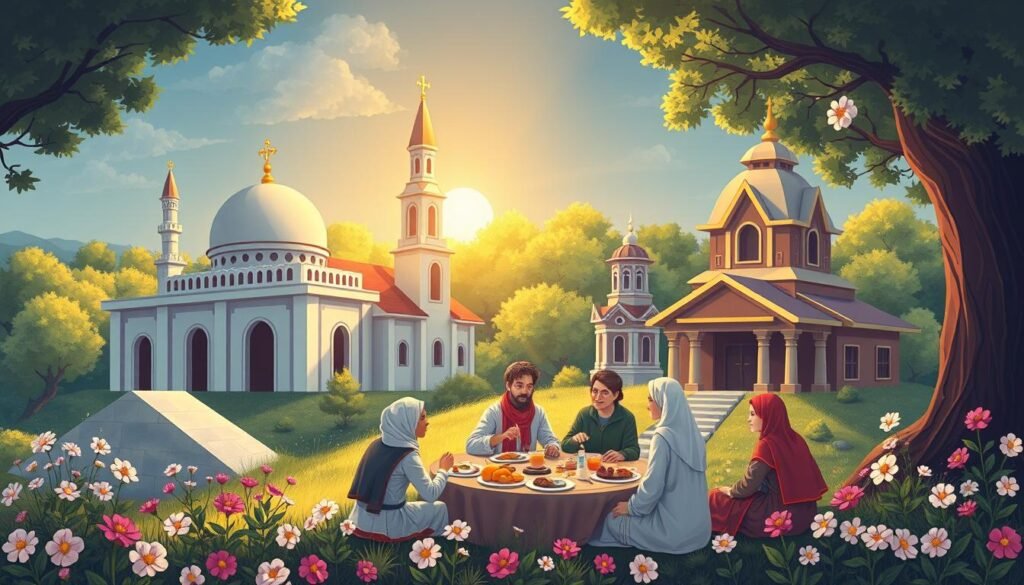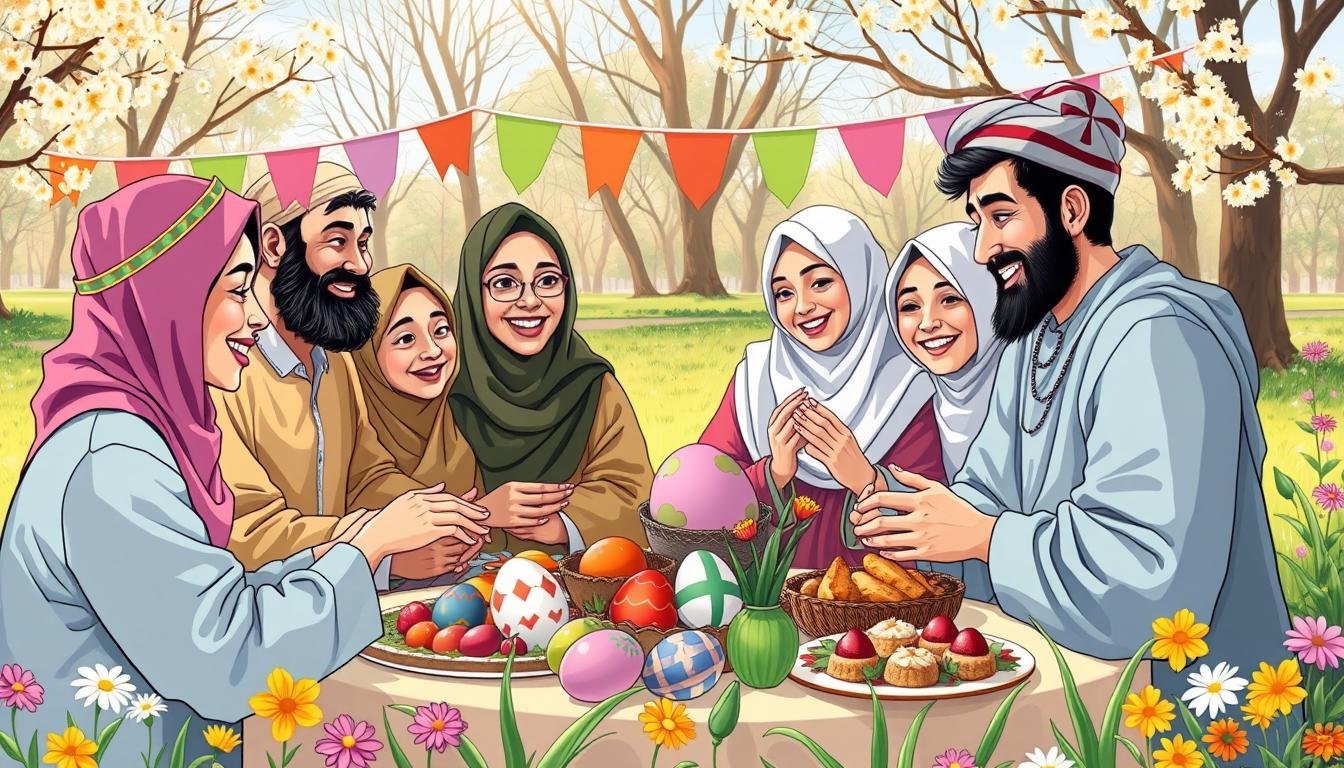Every spring, Easter’s bright colors make me think deeply. Can Muslims, who see Jesus as a prophet, join in Easter celebrations? This question makes us look at the complex world of faiths and how they connect.
Though Muslims respect Jesus, they see things differently than Christians. For example, the Quran says Jesus wasn’t crucified. Instead, God took him up (Quran 4:158). This shows how beliefs can shape our celebrations.
Exploring Easter with Muslims, we find common values in Islam and Christianity. Yet, we also see the lines that guide their choices about celebrating. Can we talk about these differences with respect and understanding?
Understanding Islamic Perspectives on Celebrations
Islamic traditions focus on celebrations with deep spiritual meaning, like Eid. These events bring the community together and strengthen faith. Each celebration is done with care, making sure it follows Islamic teachings.
On the other hand, joining in secular celebrations like Easter can be tricky. It makes people wonder about cultural practices.
The teachings of Prophet Muhammad (peace be upon him) guide us. He warned against adding new things to religion that aren’t needed. This shows the importance of keeping Islamic identity strong in a world with many cultures.
Respecting Islamic ways often means being careful with celebrations from other religions.
Looking at how celebrations change over time is key. For example, Easter has roots in old pagan customs, like eggs and bonfires. This helps us see why Muslims might not join in.
Staying true to Islamic traditions helps Muslims deal with other celebrations. It shows respect while keeping their beliefs strong.
The Religious Significance of Easter
Easter is a key time in the Christian calendar. It marks the Easter significance with the resurrection of Jesus. For Christians, it brings hope, renewal, and the promise of eternal life. It shows the heart of Christian beliefs.
The story of Easter is deeply rooted in the New Testament. It tells of Jesus’ resurrection, a cornerstone of faith for many believers.
Easter is linked to Jewish celebrations like Passover. Both share themes of freedom and change. Easter focuses on Jesus’ victory over death, while Passover remembers the Israelites’ escape from slavery. This shows Jesus’ story is part of a bigger tale of salvation.
Christian traditions like Holy Week and the Last Supper highlight Easter’s importance. These rituals are more than just memories. They are ways to show faith and connect with others. By joining in these traditions, people deepen their understanding of Easter’s meaning. They see the power of Jesus’ life, death, and resurrection.
Can Muslims Celebrate Easter?
Many wonder if Muslims can celebrate Easter. This question dives into deep religious beliefs. In Islam, Jesus, or ‘Isa, is seen as a prophet, unlike in Christianity.
It’s important to understand this difference. This helps us see how Muslims view Easter.
Muslim Views on Jesus and Easter
The Quran talks about Jesus 25 times. He is seen as the Messiah, a title of great respect. The Quran tells of his miracles, like making birds from clay and healing the sick.
But Muslims don’t believe in Jesus’ crucifixion and resurrection like Christians do. They believe he was taken up by God, as the Quran says in verses 4:157-158. This belief changes how Muslims see Easter.
The Difference Between Resurrection and Ascension in Islam
In Islam, there’s a big difference between resurrection and ascension. While Christians celebrate Jesus’ resurrection, Muslims believe he was raised by God without being crucified.
This view makes Easter different for Muslims. They honor Jesus’ teachings but don’t celebrate the holiday. This topic is often discussed among scholars and Muslims. For more on Jesus in Islam, check out this link.

Scriptural Insights from the Quran
The Quran gives deep insights into Jesus, focusing on his miraculous birth and special role among prophets. In Surah 4:157-159, it clearly says Jesus wasn’t crucified. This shows a big difference between Islamic and Christian beliefs.
It also talks about Jesus’ life in the Quran. It mentions his miracles, like healing the sick and bringing back the dead, in Surah 5:110. These stories show Muslims’ respect for Jesus but also highlight the faiths’ differences.
Muslims see all prophets, including Jesus, as sinless messengers of God. They believe these prophets guided humanity. This view shows respect for Jesus but also says no prophet is divine.
The stories about Jesus, like his resurrection, show the complex ties between Islam and Christianity. These stories are key to understanding the faiths’ differences.
Historical Context of Easter in Abrahamic Religions
Easter history is woven into the fabric of Abrahamic religions, like Judaism and Islam. This season highlights themes of salvation and freedom. Easter and Passover, from April 6 to 14, share a common thread.
Easter fell on April 9 in 2023. This shows how these holidays can overlap.
The book Abraham: One God, Three Wives, Five Religions explores the shared roots of Judaism, Christianity, and Islam. It tells the stories of Isaac and Ishmael, showing the ties between these faiths. Despite differences, it’s important to respect and unite.
Seeing the value in God’s Messengers can lead to understanding and dialogue. This can help interfaith traditions grow. The stories remind us of our shared heritage, promoting unity and community.
Comparison of Easter with Other Religious Festivals
Easter and Jewish Passover share interesting similarities. Easter, a Christian holiday, has roots in Judaism. Both celebrate sacrifice and redemption.
This shows how traditions grow and connect across faiths.
Shared Elements in Judaism and Christianity
Passover tells the story of the Israelites’ freedom from slavery. It includes the Seder meal with symbolic foods and stories. This meal brings Jewish families together.
Easter also focuses on family, with dinners and meals that bring people together. This shows the importance of unity in religious festivals.
Every thirty-three years, Easter, Passover, and Ramadan align. This happens because of different calendars used by each faith. This overlap encourages dialogue and cooperation.
It highlights the themes of renewal and freedom in these holidays. It helps communities come together.
Exploring Jesus’ role in Islam and Christianity can deepen our understanding. Resources like insightful articles can help. They show the beauty of our diverse traditions.
The Stance of Islamic Scholars on Celebrating Non-Islamic Holidays
Islamic scholars have different views on Muslims joining in non-Islamic celebrations like Easter. They often talk about sticking to Islamic rules and the effects of joining in on faith. Some say it’s okay to go if it helps Muslims, but others worry about copying beliefs that go against Islam.
Fatwas and Guidelines on Participation
Fatwas are key for knowing what’s okay in non-Islamic events. Scholars say keeping good relations is vital, but Muslims must be careful. Going to Easter, for example, might clash with Islamic teachings.
Most agree that Muslims shouldn’t congratulate others on their religious days. But, it’s okay to join in if it helps understanding. Yet, they warn against anything that goes against Islamic values.
Islamic Principles Related to Imitation of Other Religions
Islamic scholars stress avoiding copying non-Islamic ways. Dressing like others or joining in celebrations that go against Islam is not allowed. It’s forbidden to join in festivals that support false beliefs or bad ideas.
Also, things like too much fun, mixing with women freely, music, or eating forbidden foods are not okay. This careful way shows the need to keep Islamic values strong in a world with many faiths.
The Concept of Interfaith Relations
Interfaith relations are key in our diverse world. Exploring Easter significance in the Christian faith helps Muslims and Christians talk. Easter’s themes of resurrection and hope can unite people with different beliefs.
How Easter Represents Christian Beliefs
Easter shows the Christian belief in resurrection. It means new starts and eternal life. This holiday is deep in faith and shows spiritual renewal’s power.
It lets Muslims talk with Christians, celebrating their faiths. This helps respect their beliefs.
Today, we need to work together. Leaders from different faiths, like the Ahmadiyya Muslim Community, are leading the way. They’ve held interfaith iftars in many cities.
This creates chances for talking and understanding. It breaks down walls and builds strong bonds. These bonds are based on kindness and helping others.
Reflections on Shared Values Across Religions
Many religions guide us on how to live and treat each other. In Islam and Christianity, common values like kindness, mercy, and community are key. These values help us understand and respect each other, leading to meaningful interfaith dialogue.
Both faiths teach the importance of loving and caring for one another. This supports unity in different settings.
When Easter and Ramadan happen at the same time, it’s a chance for dialogue and teamwork. Easter celebrates Jesus’ resurrection, bringing hope and renewal. Ramadan focuses on self-control, empathy, and community.
During this time, both faiths can think about their shared goals for the community’s well-being. This is a moment to come together.
Doing things together, like helping others or celebrating, helps us bond. The shared value of compassion is a strong bond between Muslims and Christians. By seeing common values, we can move past our differences and work together.

Modern Muslim Communities and Easter Observances
In today’s world, modern Muslims take part in many celebrations, including Easter. These events help people come together, understanding and respecting each other’s beliefs. It’s a chance for everyone to share their faith in a respectful way.
Interfaith Celebrations and Community Events
Modern Muslims join in interfaith events, celebrating shared values and each religion’s uniqueness. This brings people together, strengthening community bonds. By working together, we can learn about Easter’s cultural side, promoting respect for all traditions.
Concluding Thoughts on Religious Celebrations
Thinking about whether Muslims can celebrate Easter shows us the importance of understanding and appreciating different cultures. Muslims see Jesus as a respected prophet but don’t believe in his crucifixion and resurrection like Catholics do. This doesn’t stop us from respecting and learning from each other’s celebrations.
Experts and leaders say it’s key for Muslims to focus on their own holidays like Eid al-Fitr and Eid al-Adha. This helps keep their faith strong. But, it’s also good to find common ground with other religions. Sheikh Asim Khan says we should respect our own traditions but also try to see things from others’ viewpoints.
The real goal is to bring people together, not to divide them. By focusing on what we share, like respect and understanding, we can create a more welcoming world. Celebrating our differences and learning from each other can help us build a kinder, more united society.
FAQ
Can Muslims participate in Easter celebrations?
What is the Islamic perspective on Jesus and his significance?
How do interfaith relations relate to Easter?
What elements connect Easter with other religious festivals?
What do Islamic scholars say about participating in non-Islamic holidays?
What values do Islam and Christianity share?
How do modern Muslim communities relate to Easter?

Embracing Faith, One Insight at a Time!
The teachings of the Quran have always guided my path. With a deep passion for Islamic knowledge, I strive to blend the wisdom of tradition with the relevance of today, making the timeless messages of Islam accessible and meaningful for everyone.
Muslim Culture Hub is my platform to share historical insights and thought-provoking articles, exploring both well-known and lesser-discussed aspects of Islamic culture and beliefs. My mission is to create an inclusive online space where everyone can learn, strengthen their faith, and connect with the profound message of Islam.
Join the journey!
May peace be upon you.








